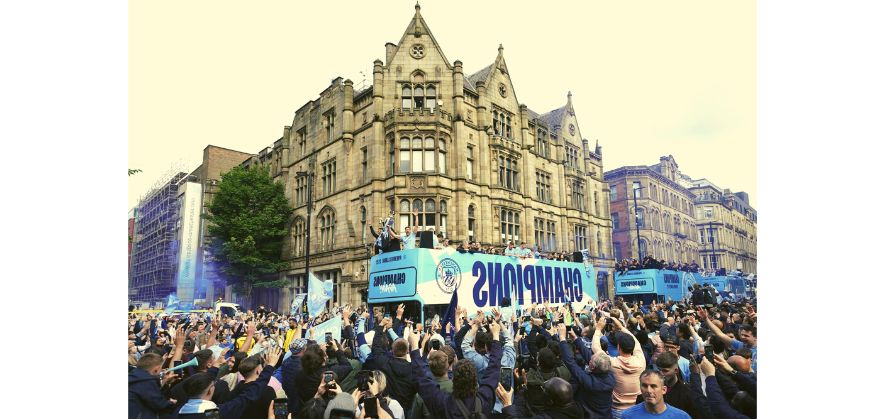Soccer fandom has so many interesting peculiarities.
The game is really able to bring together people from different nationalities and cultures, particularly when a team that fans rally behind is winning a match.
One way that fans get involved with the action is when they use certain songs or chants to express themselves and how they feel in the stadium.
If you’ve been a soccer viewer for a number of years then there’s little doubt that you’ll have come across fans singing the “Olé! Olé! Olé!” chant.
Now, a seasoned watcher will know exactly what this chant is and why it’s sung.
But for those that don’t, this article will reveal exactly why fans say it from time to time.
For a succinct answer…
Soccer fans say “Olé” as a way of taunting the opposition when their own team are dominating possession of the ball. It’s usually said to mock the other team every time the players from the dominant side make a successful pass.
Read on to find out more about this particular fan term.
What does olé mean?
To help with more context, it’s important to learn about the original meaning of the word.
It is in fact a Spanish interjection that’s used to cheer on or praise a performance that takes place in a bull fighting ring.
In bull fighting, the word is chanted by a happy crowd who are pleased with the series of moves that the bull fighter has been able to pull off during a live performance.
When the bull rushes towards the red mantel being held by the fighter, and the latter is able to successfully whisk it away from the bull’s path just in time, the crowd typically let out an “olé” as a way of approving and appreciating the skill of the fighter.
Reasons why fans chant olé
Here are the two main reasons why fans chant the ole term today:
1. Taunting the opposition

Picture this.
Manchester United are losing by three goals to their fierce rivals Leeds United at Elland Road.
In the second period of the match, the Leeds United players are comfortably knocking the ball between themselves within their own half of the field.
The players representing Manchester United are unable to steal the soccer ball from their opponents, putting a lot of effort into chasing after players and closing off passing lanes.
Unfortunately for them, Leeds United players are just too good on this fateful day, as they’re able to easily retain possession and leave the Manchester players chasing shadows.
This is an eerily similar situation to the bull described earlier, who can’t touch the red mantel no matter how fast they run towards the cloth or the matador holding it.
So, with the players unable to retrieve the ball, Leeds United supporters would chant out “olé” each time a pass is completed by one of the players representing their team.
And when a Leeds player is in possession of the ball, the fans build up to chanting out the term by letting out a long and progressive “oooooohhhh” sound until the ball is released and lands at the feet of a team mate, subsequently completing the chant with by letting out the connecting “le” sound.
Here’s some video footage that shows how this works:
Typically, fans will only say “olé” when their team has a comfortable lead over the opposition, which is typically characterized by a three-goal lead at the minimum.
They’re much less likely to use the term when a winning team is only ahead by a slender margin of a goal or two, because the course of a match can swing in favor of the opposition quite quickly in soccer.
2. Celebrating a league or cup championship victory
The word “ole” is also used in soccer within a celebratory context.
Essentially, a soccer team that has won a league title or a cup competition will generally have a moment where they sing a celebratory song in the dressing room after the game.
For instance, Manchester City recently won the 2021/2022 English Premier League title and their players could be seen singing the “Campeones Campeones Olé Olé Olé” anthem in the changing area.
You’ll see the likes of John Stones and Kyle Walker jumping up and down whilst shouting the term as loud as they can.
Here’s a clip of this happening:
This then extends to fans, who would sing this same song with the club when the winning players and manager take a victory parade around the city in a large open-top coach.
Which looks like this:

Who started the olé chant?
The “olé” chant gradually made its way in to soccer, initially being used as a simple way of praising a player who has put in an exceptional performance.
According to historical evidence, the Brazilian player Mané Garrincha was the first recipient of the “olé” chant as he put on a fantastic display in a game between Botafogo and River Plate.
Garrincha was basically toying with a particular opponent and the fans in attendance loved what they saw, which then prompted them to let out several successive “olés” with every body feint that Garrincha pulled off against a River Plate defender.
But over time, the word’s use grew to be less specific as the game advanced and became more widely watched across the globe.
Conclusion
This article has covered what “olé” means in soccer and why fans love to say the term when their team is in a dominant phase.
For more content on what soccer fans do during games, check out the articles below:
If you enjoy the content that I create and would like to buy me a coffee, then I’d really appreciate it!
Any money that I earn through this donation will be re-invested into more content for this website.
Additionally, by sending in a donation you’ll also receive a copy of my recently released 190+ page eBook on Soccer Ball Care, as well as be subscribed to our mailing list where you’ll be regularly informed on the latest developments concerning the Soccer Whizz blog.
- Future Icons: Europe’s Emerging Midfield Maestros Set for Glory - December 4, 2023
- Kickstarting a Revolution: How Soccer Transformed the United States Over the Last Four Years - October 7, 2023
- 4-1-4-1 Soccer Formation [Analysis] - September 23, 2023

